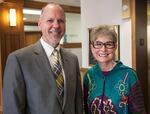REPRESENTED
Think Out Loud is traveling to cities and towns across the state to hear about the policy issues that matter to Oregonians. How do the decisions of lawmakers in Salem affect our lives? See our full coverage here.
Rachel Hestmark grew up in Portland. She never imagined she would be caught up in sex trafficking. But it happened all too easily. She says she was a naive, inexperienced 19-year-old who went with two new friends to California, where she thought they would spend a few weeks dancing at strip clubs and make some fast cash. She quickly learned she had been duped and was taken across the country. She was forced into prostitution and told her family would be hurt if she resisted. She says she wouldn't wish the experience on her worst enemy.
“You don't have to die to go to hell.”
Hestmark says when she eventually got away and came home, she didn't feel she could tell anyone. At that time — in 1995 — she says, "They didn't recognize that you could be trafficked domestically. And because I wasn't trafficked internationally, they didn't have services for me."
Twenty years later, domestic sex trafficking is recognized, but many advocates say the problem is all too common, and still goes largely unnoticed.
Oregon state Rep. John Huffman (R-The Dalles) is sponsoring a package of bills aimed at curbing sex trafficking and child sex trafficking. He teamed up with a Milwaukie democrat, former Rep. Kathleen Taylor, who is picking up where her predecessor Carolyn Tomei left off when she retired.

Gwen Paulson is a sexual assault advocate at Haven in The Dalles.
John Rosman / OPB
Two of the bills, HB 2206 and HB3040 deal with prosecutions, while HB 2205 would set up a fund to be used for services for girls and women getting out of sex trafficking.
Public health officials and victim advocates say while sex trafficking is a problem statewide, there's a wide perception that no such activity happens in rural areas.
Teri Thalhofer with North County Public Health says the women that come to her health clinic are often low income and vulnerable. She says she's heard anecdotally that women are brought in to the area and trafficked in the orchards to the migrant workers. Thalhofer says the medical staff at the clinic look for signs a woman is not in control of her sexual activity and try to make sure the women know what resources are available.
Lori Rosebraugh is the only Oregon State Police detective for much of District 59. She says she doesn't know that sex trafficking is happening, but she can't say for sure that it's not either.
That's why Rosebraugh says, more resources for training are needed to "make sure that all of the officers are receiving the same training." She says, "I know that our younger officers receive just a splash of training (in this area)."
Rosebraugh says she thinks it's possible that if more officers were available, they'd be better able to respond to more incidents or more closely analyze incidents. But for now, the regional law enforcement is focused on the Portland metro area, where most sex trafficking is concentrated.
Gwen Paulson is a sexual assault advocate at Haven in The Dalles. She say there are unique challenges serving rural areas. For one thing, she says, victims just don't have access to the same resources that are available in a metro area like Portland.
The distance, she says, can be isolating: "We serve Wasco, Sherman, Wheeler and Gilliam counties. And some of those places are two hours away. I mean, that's a day trip to go to a support group or to go to come in for services."
On the other hand, Paulson says, being a small organization in a rural area also means they have flexibility with how they use the resources available. She says when she first started at Haven a few years ago, they weren't asking all the questions about sexual violence they do today. She says there's always room for improvement, but she feels hopeful about more resources for victims in the future.



